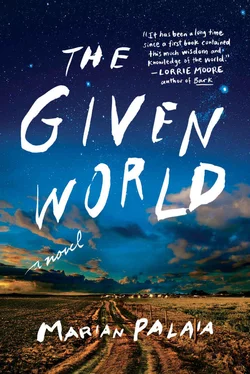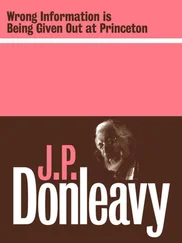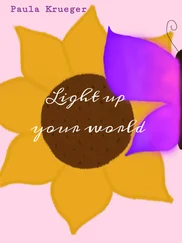I get back to the station to find the train there, get on and claim a seat. I watch as more passengers arrive on the platform below, with their duffel bags and backpacks, rolling suitcases large enough to contain one large body or maybe two small ones. A dark-haired young woman stands by silently, carrying a black, busting-at-the-seams knapsack, a banjo case tucked awkwardly under her arm, a small metal box, and a white plastic bag with a red drawstring. A few minutes later she is standing in the aisle, asking if the empty seat next to me is taken. She turns out to be more girl than woman; sixteen, seventeen at the most. Her eyes are very blue — a cobalt almost black — and reflect more light than seems possible considering how dark they are. She’s pretty, but not the traffic-stopping kind, not as skinny and flat-chested as she is, in a gray hoodie, baggy camo pants, self-administered (it looks like) haircut, a scattering of piercings, and no makeup save for a smudge of black liner under her eyes. She reminds me of someone I know but can’t place — probably one of the young, just-coming-out lesbians at the bar.
“Nope,” I say. “It’s all yours.” I tuck my feet under me as far as I can, and pull down the armrest.
She shoots me a timid smile and thanks me. Slides the banjo case and the knapsack into the overhead rack, creeps into her seat, and sets her box and the plastic bag on the floor. After a minute, she picks up the box and holds it in her lap, drawing little X’s across the top with her finger, pressing down the corners with her thumbs. She places it carefully on the floor again, and fidgets it between her feet like a kid OD’d on cotton candy. Finally, she pushes it under the seat with her heels, apparently aiming to trap it there.
As the train pulls out of the station, heads across and then up the Columbia, she holds herself tight and still, arms locked to her sides and hands in her lap, as if she is sitting at a school desk, having been scolded once already for accidentally elbowing the teacher as he passed by. I lean away from the armrest and toward the window, hoping she’ll eventually relax, or it is going to be a very long trip to wherever she’s going. I wait a little while and then ask where that is.
She seems surprised to hear a voice, and for a second appears not to know where it’s coming from. She peeks over her shoulder before she answers. “North Dakota?” she says.
I glance behind us too, but don’t notice anything suspicious. “Is someone following you?”
“I don’t think so.”
“You’re probably going to want to get comfortable, then. It’s a long way to North Dakota. And I don’t bite. I bet none of these folks do.”
The girl cocks her head, as if she is trying to determine whether or not the part about biting is actually true. Evidently she decides it is. “That’s a relief,” she says.
And she does seem to relax then, reaching into her bag for a scratched-up silver CD player and a pair of headphones that look like the cord has been delicately gnawed upon. She paws through a small collection of uncased CDs, settling finally on Elton John’s Greatest Hits . I am a little bit surprised, having expected something more along the lines of Nirvana, or Alice in Chains.
As she listens to the music, she begins to move all ten of her fingers as if plucking the strings of a phantom instrument. Not wanting to appear nosy, I turn to look at the vast, sage-green, white-capped river as it runs through the gorge and toward the sea.
Ready or not ; the words appear vaguely neon tinted across my brain. I try to leave them alone, to not worry them like I would a loose tooth when I was little, until all that remained was a raw, gaping hole, and the prospect of a dime under my pillow to alleviate any residual emptiness. I know if I follow those words — ready or not — to Montana, ghosts will appear, rising up out of the goddamn prairie like those crazy little funnels of dust. A tornado: maybe that’s the answer to too damn many people packed into a too-small emotional space. Nothing, nobody really goes away — not once they’ve infiltrated your life. No matter how many brain cells you drench in rocket fuel and hold your little lit Zippo to.
God, I’m tired.
I fold up my jacket and stuff it between the seat and the window, lean my head against it, and try to think about other things, or to sleep. I’ve been up a day and a half already but can’t seem to keep my eyes closed long enough to nod off. We are headed into evening, but the sun hasn’t even come close to setting. We’ll follow the river farther and farther east, and it will still be light at nine o’clock, and at ten. I had forgotten, almost, how it goes up here in the summers: twilights lasting hours, skies the deepest, most ridiculous blue, horizons absurdly far off. It is like the ocean, in a sense, except that it really, absolutely, is not like the ocean at all. Not anymore it isn’t.
After some in-between time spent simultaneously beckoning and fighting sleep, I give up and turn to the girl next to me, who has been changing CDs every once in a while and is now listening with her eyes closed, fingers still picking away.
“You know,” I say to her, “all this used to be underwater.”
The girl blinks at me, takes off the headphones. “What?”
“Water,” I say again, pointing out the window. “All this used to be underwater.”
“No shit?”
“No shit.”
“How much water?”
As the girl listens, wide-eyed at the sudden dissertation, I explain about the ancient glacial lake, the one that once covered a whole corner of Montana and then some. Lake Missoula. Every few hundred years, it would fill enough to float the two-thousand-foot-tall ice dam that held it back, in what would someday be (and still is) the northern Idaho panhandle we are heading for — home to old hippies, tweakers, skinheads and wolves, or so the papers say.
“They say that about us too.” The girl sounds disappointed, but I can’t be sure if it is with the reporters or the people they write about.
“Us?”
“Oregon. The parts that aren’t Portland or Ashland or Bend. That leaves a whole lot of spots to park your little meth lab in. Your pot farm. Or your gun rack full of semiautomatics. For Bambi.”
“You think they’re right?”
“I don’t know. Maybe. I never did ever see a wolf, though.”
“Maybe we’ll see one in Montana.”
“When do we get there?”
“Early tomorrow morning. And all day to cross it. I’m supposed to get off about halfway.”
“Supposed to?”
“Going to.”
She nods, tentatively, but keeps looking at me with something that could be mistaken for attentiveness, so I go on talking about the ice dam. When it started to float, I tell her, it would break down a little bit at a time, and eventually all the water would come crashing through, the whole lake draining in a few days. Billions of gallons, carving out new channels in the land, or widening and deepening old ones, every time it happened.
“Sounds crazy,” she says, but there is no detectable disbelief in her voice, just a familiar and painful wonder. Of course it was Mick who told me this story, among a million others, as I sat at his feet with that very expression on my face.
“Yes, ma’am,” I say, not missing more than a single beat. “That’s where this entire river came from, and this gorge, and smaller canyons, lakes, ponds — everything we can see. They’ve found pieces of Montana all the way at the Pacific Ocean.”
I consider the broken and fused-back-together landscape. Chunky, ash-colored rock and scrubby brush, more gray than green; buttes and huge potholes that must sometimes hold water but are all dried up now, cracked earth the predominant decorating scheme. Evidence of calamity is all around, if you know what to look for.
Читать дальше












